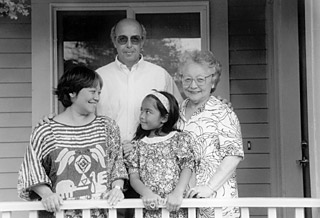Choosing Family
AR: And then the other entity that steps in, for better or worse, is the government. Irshad, among all of her associations, is also from Canada, where they have a slightly more humane government than we do here.
One of the things that the Canadian government has done, as a kind of test case, is to include unpaid work in their GNP. And their GNP increased it by 30 percent or 20 percent, which proves how much work gets done raising children and taking care of households.
Irshad Manji: Which is not to say that government has done anything about that.
AR: Well, I was going to ask. I think that in the United States, we’re supposedly the only industrialized country that doesn’t have a national system of childcare. We don’t have a national system of healthcare, and all of these things are important components of the family. So are we wrong to idealize our Canadian neighbors?
IM:Yes. Next question?
AR: And the other thing is that, in Canada, you don’t even have gay marriage.
IM:Right.
AR: I was telling this story earlier – about a year ago, I went to breakfast with a friend of mine who had been in a long-term relationship with her girlfriend. I showed up at breakfast and she had this enormous diamond ring on her ring finger, and I went, “Oh my gosh, are you engaged?” And she said yes. She went on to tell me the most fairytale story about how she and her girlfriend had gotten engaged: they were in Paris; it was a surprise; she got down on her knee and she had a Tiffany’s box. They were going to have a huge wedding in Maine.
All these things and my reaction was: is it progress that non-heterosexual couples can choose this? Or is it regression that this is what we want? That our way to be accepted is to conform to the stereotype? I don’t know if you want to address that a little bit, because we were talking earlier about your relationship with Michelle and some of the work that you both do.
IM: Let me first say that for Valentine’s Day, Michelle took me to the Golden Griddle. So it’s not exactly a diamond ring, okay?
(laughter)
It’s love, as far as I’m concerned. I will also tell you that I do wear two rings. And fairly recently, actually. I have for many, many years worn this gold ring which has an Arabic inscription in it for Allah, God. And on this finger, of recently, I’ve worn my commitment ring, if you will, to Michelle. We cringe at these words because we just find it so – it doesn’t capture how we really feel about each other. Sometimes we’re companions; sometimes we despise each other. We obviously love each other even when we despise each other. We’re friends all the time, but we fight like cats and dogs. And it’s just wonderful to have that kind of a person in your life. So one of the things I’m thinking about asking in the book that I’m writing about how Muslims can and must come to terms with diversity – I realize that this is a little bit off the mark, but I will get back to the focus. I’m absolutely out in this book. No use in hiding who I am – but I really want to know, from militant Muslims, I want to ask this question and I probably will if it’s not edited out: which hand are you going to chop off first and why?
In other words, I wear two rings, one of which symbolizes my commitment to God. And the other of which symbolizes my commitment to my partner. And the two are intricately linked, as far as I’m concerned. Now, you obviously are not going to have me fit into your model of what a Muslim is, so which hand are you going to amputate first?
But more importantly: why? Back it up before you chop it off. That’s what I want to know.
So back to the question of gay marriage, if you will
(laughter)
IM: I just want evidence. Evidence-based argumentation. Let’s have it out. Michelle, as I was saying to Amy, is the president of the Foundation for Equal Families in Canada. And as it’s name suggests, it’s all about ensuring equality of law and policy for diverse families.
On our second date, when it was obviously clear that we really, really liked each other, she asked me two questions. She said, “Do you want to have kids with whoever it may be?” And I said , “No, do you?” She said, “No, thank God, no, I don’t.”
And then, because it was always an issue for each of us in our other relationships, she said, “Do you want to get married? Because in Canada, you know it’s going to happen at some point. There’s no assuming that it won’t happen.” And I said, “You know, no!” And she said, “Neither do I.”
But I said, “Are you against marriage?”
And this was before I knew that she was the president of this foundation. And she said, “No, I really believe in everybody’s right to choose.”
And feminism as a word, even as a concept, didn’t enter our discussion about this. It was assumed that as outspoken, self-confident women we are feminists whether or not we call ourselves that. So anyway, we were both very clear with each other that while we would advocate the right of other people to choose this, it’s not a choice that we make. And we don’t feel the need to apologize for it.
It’s just a wonderful choice to have. Is it regression? I think the choice of having, the reality of having that choice, I don’t see how it could be regression. I think there is such a thing, in a materialistic culture, as the tyranny of choices. But I wouldn’t equate the choice to be married to your partner with some kind of commodity. I would hope that people would think about it a little bit more carefully than just retail therapy. So, for me, the choice is never an indication of regression. The question is: will we ask the questions we need to ask of ourselves before we jump into it? Hence, it all comes back to evidence-based argument.
But Do Women Have a Choice?
AR: And choice. That’s something, when I’m asked to define feminism, that’s something I always say. It’s not so much what choice we make, but the freedom to make that choice.
Feminists have always talked about the family. We go back to 1963 when Betty Friedan wrote The Feminine Mystique about women fleeing their houses and leaving behind their brooms and entering into the workplace.
They did a really good job of ensuring for the next 20 or 30 years that women could have an equal place in the workplace, but what we didn’t revolutionize was what we were doing at home. Everybody here has said – or Leora specifically said that her mother was still responsible for what happened in the home.
Jennifer and I have a chapter in our book called “Thou Shalt Not Become Thy Mother,” which is both a chapter that examines our relationships with our mothers, our biological mothers and the women who raised us, and also, more figuratively, our relationship with our “movement mothers.” We heard our feminist mothers saying to us, “Be liberated. Go out and make all these choices,” but what we saw them at home doing was replicating that kind of sexism. That chapter and the ideas in it have caused a lot of tension among feminists.
And I think that tension ties into our understanding of family because family is such a personal place. It really hurts people when you’re making different choices because it’s seen as a judgment. I don’t know if you want to address that idea.
LT: Sure. There’s competitiveness among women in all different areas of life, from how thin you are to what you’re wearing, to who you’re dating. Whether you’re dating a man or a woman. Everybody is always checking everybody out. There’s a lot of competitiveness. But this chapter you’ve mentioned in particular, it’s about competitiveness between mothers.
I started facing this kind of competitiveness even before I gave birth to my first child. When I was visibly pregnant, people would say, “Are you going to breastfeed? Are you going to have an epidural? Are you going to go back to work?” And you can’t win because no matter what answer you give, it’s the wrong one. But the really loaded issue is, “Are you going to go back to work. If so, when? How old will your child or children be when you go back to the labor force? Will you be going back part time or full time?”
To be a good mother – according to the way our culture defines a good mother – you shouldn’t go back to work at all until your youngest child is in kindergarten or first grade. And even then, you shouldn’t be working a full-time job. You need to get home in time to be there when your child gets home from school and cook a nice, nutritious dinner with a starch and a vegetable and a protein.
So you’re obviously not going to be climbing any major career ladders, if you keep that up. And I’m not the good mother. Actually I don’t really know anybody who fits the bill of the good mother. Why is there so much competitiveness? Why do we look at each other – mothers, I’m talking about – and judge each other and gossip about each other behind each other’s backs, because there is no right way to be a mother. And we really haven’t been taught what the right way is. The real answer is that we don’t have real choice, which is something you were just talking about. Many of these choices are imposed upon us.
For most mothers, whether or not they decide to go back to work part time, full time or not at all, has to do with their economic situation, what kind of child care is available to them in their neighborhood, how expensive that child care is. If they have a partner, what their partner’s financial situation is. If they have a financial safety net through a partner at all. Health insurance considerations. I don’t know anybody who makes a real choice. When it comes down to it, a constellation of situational forces kind of descend and you end up in a situation.
You end up following that path. Nobody likes to admit that. And what ends up happening – I know I’m generalizing, but I do find this to be true – nobody likes to admit that that’s really what happened. Instead, what they like to say is that they did make a choice and their choice was the right one, and here’s why. I can be very specific about that. I have lots of girlfriends, lots of women in my peer group who are full-time stay-at-home moms. And if you ask them, “What led you to this choice or this lifestyle?” they will almost always say, “It’s better for my family and better for my children.” But if you dig a little deeper, you will find that that’s not why they initially went that route. Initially, it was because they had been laid off right before they gave birth or right after. Or they gave birth and wanted to work part-time, but their supervisor or employer wouldn’t let them. Or they had just moved from one city to the other and had a child and it was just really hard to find a new job. There ended up being a million other reasons that had nothing to do with the well being of their families. And yet, because of the dominant line and the dominant conventional wisdom about what it means to be a good mother, you’re expected to do everything because it’s good for the well being of your family.
We assimilate that and internalize that and so, even if it hasn’t colored our decisions, when we talk about it to ourselves or to others, we give that as the explanation.



